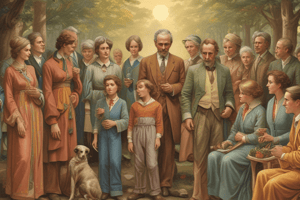Podcast
Questions and Answers
What is one of the primary roles of the family in society?
What is one of the primary roles of the family in society?
- To provide recreational activities for children
- To serve as an entertainment source for its members
- To impart essential life skills and cultural practices (correct)
- To ensure political engagement in communities
Which of the following is NOT a recognized function of the family?
Which of the following is NOT a recognized function of the family?
- Legal (correct)
- Reproductive
- Emotional
- Social
How do different family structures influence value formation?
How do different family structures influence value formation?
- By enforcing strict adherence to traditional values
- By allowing for varying perspectives on societal issues (correct)
- By promoting the same set of universal values across all cultures
- By eliminating any impact on personal identity
What cultural aspect significantly impacts child-rearing practices?
What cultural aspect significantly impacts child-rearing practices?
What are the potential societal implications of strong family units?
What are the potential societal implications of strong family units?
Which trend reflects a significant change in family dynamics?
Which trend reflects a significant change in family dynamics?
What challenge can reshape family values in contemporary society?
What challenge can reshape family values in contemporary society?
Which core value is typically instilled by families?
Which core value is typically instilled by families?
Flashcards are hidden until you start studying
Study Notes
Values: The Family as a Natural Institution of Society
-
Definition of Family:
- A group of individuals connected by blood, marriage, or adoption.
- Acts as a primary social unit influencing individual identity and values.
-
Role in Society:
- Provides emotional support and security.
- Serves as the first agent of socialization, teaching norms, values, and cultural practices.
- Shapes moral and ethical frameworks.
-
Functions of the Family:
- Reproductive: Ensures the continuation of society through procreation.
- Economic: Provides financial support and resources for its members.
- Educational: Imparts essential life skills, knowledge, and cultural heritage.
- Social: Fosters social connections and relationships both within and outside the family unit.
- Emotional: Provides love, care, and a sense of belonging.
-
Influence on Values:
- Families instill core values such as honesty, respect, and responsibility.
- Different family structures (nuclear, extended, single-parent) can influence value formation and perspectives on societal issues.
-
Cultural Variations:
- Family values may vary significantly across different cultures, impacting child-rearing practices and societal roles.
- Some cultures emphasize collectivism, while others prioritize individualism.
-
Challenges:
- Modern societal changes (e.g., technology, economic pressures) can affect traditional family structures and values.
- Issues such as divorce, single-parenthood, and blended families can reshape value systems.
-
Importance of Strong Family Units:
- Contributes to social stability and cohesion.
- Strong families can lead to healthier communities and lower crime rates.
-
Trends:
- Increasing acceptance of diverse family forms (e.g., same-sex families, cohabitation).
- Shift towards more egalitarian family roles, affecting the distribution of responsibilities and values within the family.
-
Conclusion:
- The family remains a fundamental social institution, deeply influencing personal values and societal norms.
- Understanding family dynamics is crucial for grasping broader societal changes and challenges.
Definition of Family
- Family consists of individuals linked by blood, marriage, or adoption.
- Functions as a fundamental social unit that shapes individual identity and values.
Role in Society
- Provides emotional support and a sense of security to its members.
- The first agent of socialization, teaching essential norms, values, and cultural practices.
- Constructs moral and ethical frameworks that guide behavior.
Functions of the Family
- Reproductive: Ensures societal continuity through procreation.
- Economic: Offers financial stability and resources for household members.
- Educational: Teaches life skills and transmits cultural heritage.
- Social: Cultivates social networks and interpersonal relationships beyond the family.
- Emotional: Fosters love, care, and a sense of belonging among members.
Influence on Values
- Families instill fundamental values like honesty, respect, and responsibility in their members.
- Different family structures (nuclear, extended, single-parent) impact value formation and societal perspectives.
Cultural Variations
- Family values significantly differ across cultures, affecting child-rearing practices and societal roles.
- Some cultures emphasize collectivism, while others focus on individualism.
Challenges
- Modern societal changes, such as technological advances and economic stress, impact traditional family dynamics and values.
- Issues like divorce, single-parent families, and blended families can alter established value systems.
Importance of Strong Family Units
- Contributes to social stability and community cohesion.
- Healthy family environments correlate with lower crime rates and better overall community health.
Trends
- Growing acceptance of diverse family forms, including same-sex families and cohabitation.
- A shift towards more egalitarian roles within families, affecting responsibility distribution and family values.
Conclusion
- Family remains a critical social institution, deeply influencing personal values and societal norms.
- Understanding the dynamics of family is essential for comprehending broader societal changes and issues.
Studying That Suits You
Use AI to generate personalized quizzes and flashcards to suit your learning preferences.




